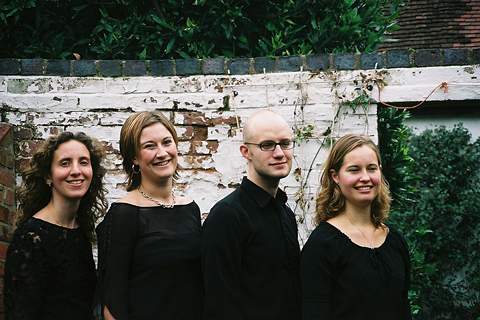|
<< -- 4 -- Roderic Dunnett DESTINED FOR THE TOP

For me, in addition to Astor's French tour, the plum among their programmes features the glorious Swiss-German soprano Sabine Wüthrich.
It's entitled 'Bach and his Competitors', and it focuses on the applications for the Leipzig Kantor's job in 1723.
Telemann was famously offered the role, but having recently secured an equivalent job in Hamburg, stuck with the Hanseatic city. Several others were up for it, including Christoph Graupner (1683-1760), the same age as Telemann, two years older than Bach and himself a pupil of the deceased former cantor, Johann Kuhnau (1660-1722). Kuhnau, a Bohemian born in Saxony and former student at Leipzig University, had succeeded to St Thomas's in 1684 (the year after Bach was born) and been appointed Kantor of Leipzig's main city churches in 1701, succeeding the equally capable Johann Schelle. Graupner himself was the well-established Hofkapellmeister to the Landgrave of Hesse-Darmstadt, a prolific opera and church cantata composer. (As a young man he played harpsichord at Hamburg Opera under the prodigiously talented Reinhard Keiser.)
Up for the job, too, was Johann Friedrich Fasch (1688-1758), the youngest of this group of rivals, just turning 35, a fellow-Thuringian of Bach's, born near Weimar, who was a pupil at St Thomas's under Kuhnau and may possibly have withdrawn in Bach's favour, instead remaining until his death at Zerbst, north of Leipzig, where he had just secured a Kapellmeister appointment in 1722. The energetic Fasch had a Leipzig role anyway -- he founded the Leipzig concert series that later flourished at the Gewandhaus.
These were composers Bach admired and knew well; and they typify the quality of the Baroque composers -- many now recorded on labels such as CPO and Hyperion -- who are beginning to regain recognition after years of neglect.
I was lucky enough to catch Phoenix Rising on one of their periodic visits to Britain. So as to keep costs down for themselves (and hence for promoters, such as the Warwick Festival, directed by Richard Phillips, one of the group's great allies and champions) they use budget airlines, travel by car together and have a ready-made, centrally located base in Warwickshire.
The result is that, despite their continental starting point, they are also able to be effectively UK-based and offer value for money on a par with other British groups.
The concert I heard was impressive. Fasch's output as both choral and instrumental composer was vast, the quality staggeringly impressive. And so it was here, with Phoenix Rising's performance of his E minor trio sonata : an energised, impactfull Adagio-Allegro set the tone for a marvellous evening: vital, alert, crisp, with a superb feel of forward momentum. The group's thoughtful response to the music owed much to the exquisite long line and considerate bowing of Phoenix Rising's appealing young violinist, Lina Söderholtz, enchanting both to hear and watch in Fasch's inspirational cadenza passages. A skedaddling Presto finale from them all took the breath away.

Phoenix Rising
|
Graupner's two-part (slow-fast) canonic trio mined a different vein: the music is, if anything, more lyrical, yet elusive, subtle and oblique in its argument. It arguably needed a little more of the preceding Fasch's pzazz; both parts might have their pace adjusted to advantage. What was notably good about the Graupner, however, was the skilled way the players managed the joins, phrasing fabulously and leaning into cadences. This was a glowing, warm, perceptive performance.
Continue >>
Copyright © 22 March 2005
Roderic Dunnett, Coventry UK

|

